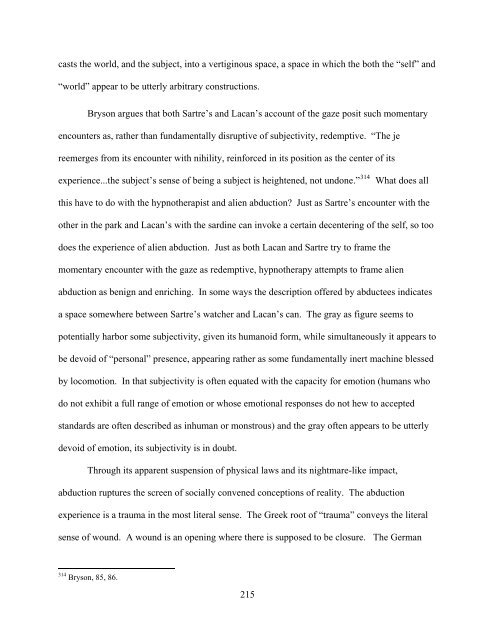A Genealogy of the Extraterrestrial in American Culture
A Genealogy of the Extraterrestrial in American Culture
A Genealogy of the Extraterrestrial in American Culture
Create successful ePaper yourself
Turn your PDF publications into a flip-book with our unique Google optimized e-Paper software.
casts <strong>the</strong> world, and <strong>the</strong> subject, <strong>in</strong>to a vertig<strong>in</strong>ous space, a space <strong>in</strong> which <strong>the</strong> both <strong>the</strong> “self” and<br />
“world” appear to be utterly arbitrary constructions.<br />
Bryson argues that both Sartre’s and Lacan’s account <strong>of</strong> <strong>the</strong> gaze posit such momentary<br />
encounters as, ra<strong>the</strong>r than fundamentally disruptive <strong>of</strong> subjectivity, redemptive. “The je<br />
reemerges from its encounter with nihility, re<strong>in</strong>forced <strong>in</strong> its position as <strong>the</strong> center <strong>of</strong> its<br />
experience...<strong>the</strong> subject’s sense <strong>of</strong> be<strong>in</strong>g a subject is heightened, not undone.” 314<br />
What does all<br />
this have to do with <strong>the</strong> hypno<strong>the</strong>rapist and alien abduction? Just as Sartre’s encounter with <strong>the</strong><br />
o<strong>the</strong>r <strong>in</strong> <strong>the</strong> park and Lacan’s with <strong>the</strong> sard<strong>in</strong>e can <strong>in</strong>voke a certa<strong>in</strong> decenter<strong>in</strong>g <strong>of</strong> <strong>the</strong> self, so too<br />
does <strong>the</strong> experience <strong>of</strong> alien abduction. Just as both Lacan and Sartre try to frame <strong>the</strong><br />
momentary encounter with <strong>the</strong> gaze as redemptive, hypno<strong>the</strong>rapy attempts to frame alien<br />
abduction as benign and enrich<strong>in</strong>g. In some ways <strong>the</strong> description <strong>of</strong>fered by abductees <strong>in</strong>dicates<br />
a space somewhere between Sartre’s watcher and Lacan’s can. The gray as figure seems to<br />
potentially harbor some subjectivity, given its humanoid form, while simultaneously it appears to<br />
be devoid <strong>of</strong> “personal” presence, appear<strong>in</strong>g ra<strong>the</strong>r as some fundamentally <strong>in</strong>ert mach<strong>in</strong>e blessed<br />
by locomotion. In that subjectivity is <strong>of</strong>ten equated with <strong>the</strong> capacity for emotion (humans who<br />
do not exhibit a full range <strong>of</strong> emotion or whose emotional responses do not hew to accepted<br />
standards are <strong>of</strong>ten described as <strong>in</strong>human or monstrous) and <strong>the</strong> gray <strong>of</strong>ten appears to be utterly<br />
devoid <strong>of</strong> emotion, its subjectivity is <strong>in</strong> doubt.<br />
Through its apparent suspension <strong>of</strong> physical laws and its nightmare-like impact,<br />
abduction ruptures <strong>the</strong> screen <strong>of</strong> socially convened conceptions <strong>of</strong> reality. The abduction<br />
experience is a trauma <strong>in</strong> <strong>the</strong> most literal sense. The Greek root <strong>of</strong> “trauma” conveys <strong>the</strong> literal<br />
sense <strong>of</strong> wound. A wound is an open<strong>in</strong>g where <strong>the</strong>re is supposed to be closure. The German<br />
314 Bryson, 85, 86.<br />
215















